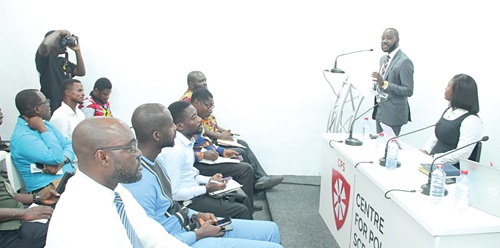The government has been urged to increase resource allocation to the Ghana Revenue Authority (GRA) to enhance performance.
“Make the 2026 revenue measures more credible by increasing resources to the GRA to implement the outlined initiatives, which include the deployment of technology to plug revenue gaps,” the Executive Director of the Centre for Policy Scrutiny (CSP), a policy research think thank, Dr Adu Owusu Sarkodie, has said.
He added that such support could spur the GRA to exceed its revenue target set in the 2026 budget to enable the government to undertake development projects in the country.
Dr Sarkodie was speaking at a forum to review the 2026 budget and economic policy of the government in Accra yesterday.
The forum reviewed the fiscal, monetary, human capital, economic growth and employment sectors.
Commendation
The executive director commended the government's decision to complete existing projects initiated by the previous government under the Big Push Infrastructure programme.
Dr Sarkodie, who is also a senior lecturer at the Department of Economics, University of Ghana, said bolstering GRA's capacity was crucial to plugging revenue gaps and improving compliance.
He also stressed the need for intensified enforcement in areas with high revenue leakage, such as customs, to maximise revenue collection.
Dr Sarkodie cautioned against compromising efficiency in scaling up of spending in 2026, and emphasised the importance of rigorous programme and project planning, transparent procurement and regular evaluation of government programmes.
Feasibility
The executive director, however, expressed skepticism about the feasibility of some aspects of the 2026 budget.
He said while the government's big push infrastructure projects and human capital elements such as Free SHS and no academic fees looked feasible, the 141 per cent increment in credits was a concern.
Dr Sarkodie called on the government to adopt more innovative approaches to strike a balance between stability and growth, saying the projected 141 per cent rise in capital expenditure should be contingent upon revenue performance.
The executive director further observed that the abolition of the COVID-19 levy and the reduction of the VAT effective rate from 21.9 per cent to 20 per cent could impact revenue mobilisation.
He also recommended that the government prioritised education and skills development to equip citizens with the necessary skills to participate in the sector.
Job creation
For his part, a senior lecturer at the Department of Economics, University of Ghana, Dr Prince Adjei, urged the government to prioritise job creation, citing the 24-hour economy policy, infrastructure development, and the establishment of new factories as key areas that could generate employment opportunities.
He also stressed the importance of tracking government policies and budget allocations to assess their impact on job creation and employment generation.

